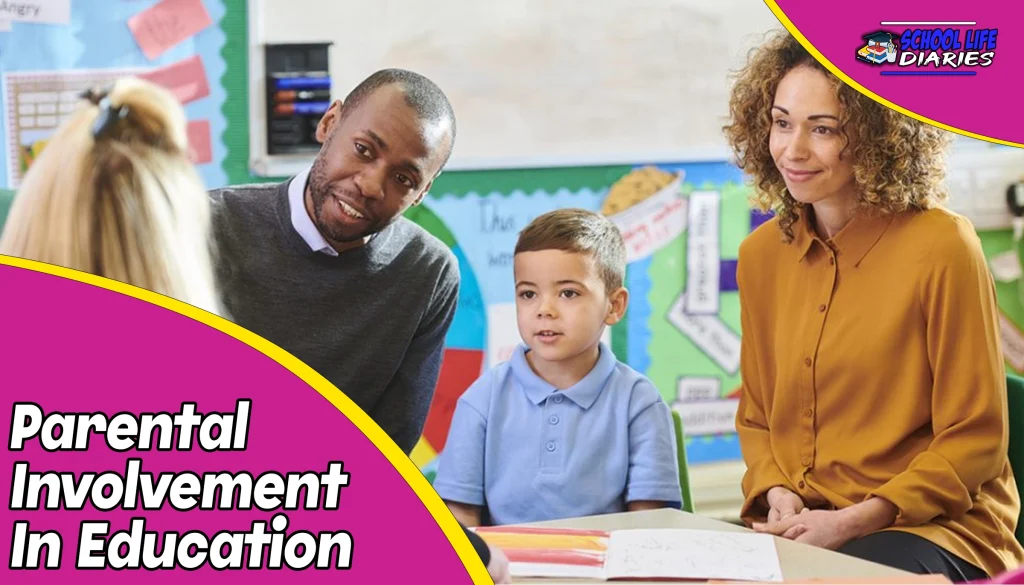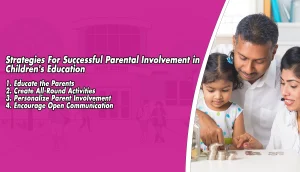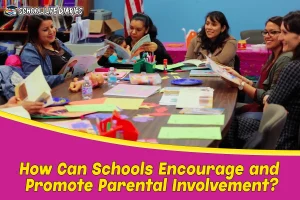Parental involvement in education is a crucial aspect of a child’s academic success. It refers to the active participation of parents or guardians in their child’s educational journey, including supporting and monitoring their academic progress, attending school events, and communicating with teachers.
The importance of parental involvement cannot be overstated as it has been linked to numerous benefits for both children and schools. Research shows that parental involvement in education leads to better academic outcomes for children. Children whose parents are involved in their education tend to have higher grades, better attendance rates and are more likely to graduate from high school.
Parental involvement has been shown to improve children’s social skills, behavior, motivation to learn, and overall well-being. In addition, when parents are involved in schools, it can lead to increased community engagement and support for educational programs. Therefore, creating strategies that enable busy parents to stay involved in their child’s education is paramount for fostering successful learners.
What is Parental Involvement in Education?
An essential aspect of educational success is parental involvement, which refers to the participation and engagement of parents in their children’s academic activities.
Parental involvement can take many forms, including helping with homework, attending parent-teacher conferences, volunteering at school events, and participating in school decision-making committees. The concept of parental involvement has gained increasing attention from educators and policymakers due to its potential positive impact on student outcomes.
Parental involvement in education is important because it can contribute significantly to a child’s academic success. Research indicates that students whose parents are actively involved in their education tend to have higher grades, better attendance records, and fewer behavioral problems than those whose parents are less involved. Additionally, when parents participate in school activities and engage with their children about their learning experiences, they can help build a positive attitude towards education and foster a love for learning that lasts long after formal schooling ends.
Why is Parental Involvement in Education Important?
Parents who are involved in their child’s education have a better understanding of their child’s strengths, weaknesses, and learning styles. This knowledge enables them to work alongside educators to develop more effective strategies for enhancing their child’s educational experience.
Parental involvement in education also has a long-term impact on students’ success. When parents engage with their children’s education from an early age, they instill values such as discipline and responsibility that serve them well throughout their academic careers. This is because parental involvement fosters a love for learning that transcends the classroom and prepares students for success in all aspects of life.
Cultural diversity plays a significant role in the importance of parental involvement in education. Parents from diverse backgrounds may face unique challenges when it comes to navigating the educational system, especially if English is not their first language. However, by working together with educators, these parents can ensure that cultural barriers do not hinder their child’s progress.
What Are Some Strategies For Busy Parents To Stay Involved In Their Child’s Education?
Busy parents can stay engaged in their child’s academic growth by utilizing time-management techniques and prioritizing communication with educators to ensure their child receives a well-rounded education.
One of the most effective strategies for managing time is to establish a daily routine that includes specific times for homework, extracurricular activities, and family time.
Another essential method for staying involved is attending parent-teacher conferences regularly. These conferences provide an opportunity for parents to learn about their child’s academic progress, discuss any concerns they may have with the teacher, and collaborate on ways to support their child’s learning both inside and outside the classroom.
Benefits of Parental Involvement in Education
Active participation of parents in their child’s academic growth leads to a range of advantages for both the student and the school. One of the most significant benefits is improved academic performance. Research has consistently shown that students whose parents are involved in their education tend to perform better academically than those whose parents are not involved.
When parents take an active interest in their child’s learning, it sends a message that education is important and worthy of attention.
Another benefit of parental involvement in education is better behavior among students. Studies have found that children who receive consistent support and guidance from their parents tend to exhibit fewer behavioral problems at school.
This could be attributed to the fact that when parents are involved, they can help their children develop positive habits and attitudes toward learning, which leads to better behavior overall.
Increased motivation is yet another advantage associated with parental involvement in education.
This motivation can translate into better attendance, increased participation in class activities, and a general enthusiasm toward learning. Ultimately, when students feel motivated to learn, it sets them up for success both inside and outside the classroom.
There are numerous benefits associated with parental involvement in education including improved academic performance, better behavior among students, and increased motivation towards learning. By taking an active role in their child’s academic growth, parents send a powerful message about the importance of education while also helping shape their child’s future success both personally and professionally.
Parental involvement can also lead to stronger relationships with their children, improved communication, and a greater sense of trust and support within the family unit.
When parents are invested in their child’s education, everyone benefits.
Strategies For Successful Parental Involvement in Children’s Education
1. Educate the Parents:
One effective strategy for enhancing parental involvement in education is to educate parents on the benefits of their engagement and how they can support their children’s learning at home.
Engaging parents in this way requires fostering communication between schools and families, providing resources that enable parents to take an active role in their child’s education, and promoting regular dialogue about academic progress.
When parents have a clear understanding of the importance of their involvement in their child’s education, they are more likely to be motivated to support learning at home. Educating parents on the benefits of parental involvement helps them recognize how their participation can positively impact not only academic achievement but also social-emotional development.
This knowledge empowers them with a sense of responsibility toward supporting their child’s success and motivates them to take an active role in monitoring and guiding their child’s education. Moreover, it helps build trust between schools and families by creating a shared vision that focuses on optimizing student outcomes through joint efforts.
2. Create All-Round Activities:
Creating all-around activities can contribute to a holistic approach toward enhancing student learning and development. Outdoor activities, art projects, and STEM projects are some of the ways in which parents can get involved in their child’s education.
These activities provide opportunities for parents to interact with their children in an informal setting and help them develop important skills such as problem-solving, critical thinking, creativity, and teamwork.
Outdoor activities such as hiking, camping, or nature walks can be great opportunities for parents to teach their children about the environment while also promoting physical exercise.
Art projects allow students to express themselves creatively while also developing fine motor skills and visual-spatial abilities. By engaging in these types of activities with their children, parents can not only enhance their child’s academic performance but also foster stronger relationships between parent-child pairs.
3. Personalize Parent Involvement:
This is where a personalized approach to parental involvement comes into play. A personalized approach means providing individualized support and creating a customized plan that meets the unique needs of each family.
This can involve identifying the specific areas where parents can contribute to their child’s education based on their strengths, interests, and availability.
For example, some parents may prefer to volunteer in the classroom or attend parent-teacher conferences, while others may prefer to help with homework or participate in extracurricular activities outside of school hours.By tailoring parental involvement strategies according to individual circumstances and preferences, schools can encourage more meaningful engagement from parents and create a supportive learning environment for all students.
4. Encourage Open Communication:
Facilitating open communication between parents and educators is vital for fostering a collaborative learning environment. Parents who are engaged in their children’s education can work together with teachers to create a supportive and stimulating atmosphere that encourages academic success.
One effective way to encourage open communication is through parent-teacher conferences, where parents can discuss their child’s progress and ask any questions they may have about the curriculum or the teacher’s teaching methods.
In addition to parent-teacher conferences, schools can also foster open communication by sending out regular school newsletters that highlight upcoming events, school policies, and student achievements. This helps keep parents informed about what is happening in the classroom and allows them to stay involved in their child’s education even if they cannot be physically present at all times.
After-school programs are another great way to encourage open communication between parents and educators, as they provide an opportunity for informal conversations about school-related topics outside of the traditional classroom setting. By encouraging open communication, schools can build stronger partnerships with parents that ultimately benefit students’ academic success.
How Does Parental Involvement Impact A Child’s Academic Performance?
The level of parental involvement in a child’s education has been shown to have a significant impact on their academic performance. Studies indicate that students with involved parents tend to have higher grades, better attendance records, and greater motivation to learn. Parent-teacher collaboration is one form of parental involvement that can positively impact a child’s academic progress. By working together, parents and teachers can create a supportive learning environment for the child.
Academic progress tracking is yet another way for parents to stay involved in their children’s education. By monitoring their child’s grades, test scores, and other academic achievements over time, parents can identify patterns and trends that may require intervention or additional support. They can also celebrate milestones and achievements with their children, providing positive reinforcement along the way.
Overall, there are many benefits of parental involvement in education, all leading towards creating a more engaged learner who is empowered by knowledge gained both inside and outside the classroom setting.
How Can Schools Encourage and Promote Parental Involvement?
One crucial factor in creating a supportive learning environment for students is fostering collaboration between schools and families. Schools that encourage parental involvement benefit from increased student motivation, better attendance, and improved academic performance. However, many parents struggle to find ways to get involved and feel welcomed by schools.
To address this issue, schools can implement incentive programs that reward parents who attend school events or volunteer their time. These programs can range from small incentives such as raffles or gift cards to larger rewards like free textbooks or waived registration fees.
By offering tangible benefits for participation, schools can encourage more parents to become involved in their child’s education.
Another effective strategy for promoting parental involvement is through community partnerships. By making an effort to reach beyond the school walls, educators can help foster a sense of belonging among families while enhancing educational experiences for students.
Conclusion:
Parental involvement in education is crucial for the academic success and overall well-being of a child. It refers to parents actively participating in their child’s learning process, which includes helping with homework, attending school events, communicating with teachers, and providing a supportive home environment.
Research has shown that parental involvement in education has numerous benefits for both the child and the school. Some of these benefits include improved academic performance, higher graduation rates, better attendance records, increased motivation and self-esteem, stronger parent-child relationships, and decreased likelihood of behavioral issues.
Despite busy schedules and competing demands on their time, parents can still stay involved in their child’s education by using strategies such as setting aside regular study time at home, attending conferences or meetings remotely if necessary, volunteering at school events, or chaperoning field trips when possible.
Schools can also play a role in promoting parental involvement by creating open lines of communication between teachers and families through newsletters or online portals.









Parental involvement in education reaps numerous benefits. It strengthens home-school collaboration, boosting student performance and self-esteem. This blog aptly outlines strategies for effective involvement – attending meetings, assisting with homework, and engaging in school activities. Such involvement nurtures a supportive learning environment, ultimately shaping well-rounded, successful individuals. Kudos for shedding light on this essential aspect of a child’s educational journey!